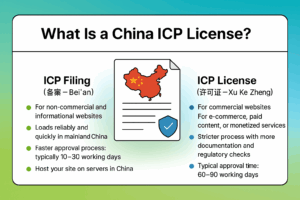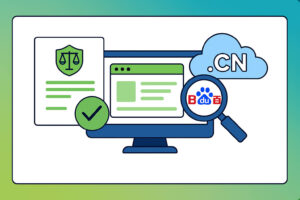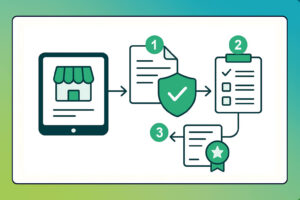If you want to launch in China, or simply want your website to have the best performance for your business behind the Great Firewall, there are three things you really can’t ignore: Visibility, speed, and compliance.
If you want to tick all three boxes, your site will need an ICP license (filing or commercial), issued by China’s Ministry of Industry and Information Technology (MIIT).
If you don’t have a Chinese legal entity, the process can feel like a maze. However, in just a few minutes, you’ll have everything you need to succeed from this article.
In this guide, you get what’s required, how to apply, and how you can launch faster with Synclone, our AI-powered localisation and static-hosting platform. We help you clear the hurdles and launch a fully compliant, high-performing site—without the usual China protocol headaches.
What Is a China ICP License?

An ICP License is the official permit required to operate a website in Mainland China. It ensures compliance with China’s internet and data regulations. There are two types of ICP licenses, depending on the nature of your business.
ICP Filing vs. ICP License: What’s the Difference?
ICP Filing (备案 – Bei’an)
- For non-commercial and informational websites
- Loads reliably and quickly in mainland China
- Faster approval process: typically 10–30 working days
- Host your site on servers in China
ICP License (许可证 – Xu Ke Zheng)
- For commercial websites
- For e-commerce, paid content, or monetized services
- Stricter process with more documentation and regulatory checks
- Typical approval time: 60–90 working days
What Are The Benefits of Obtaining an ICP License?

The ICP license keeps you fully compliant with Chinese law. No surprise audits or takedowns, you can operate with confidence—your business is officially legal.
You also benefit from much faster website load times. Hosting on Chinese servers dramatically improves performance, but you can’t use them without an ICP license. A faster site means a better experience for your users – and one that gives you much better conversions, of course.
From an SEO perspective, it’s a game-changer. Search engines like Baidu give noticeable priority to China licensed websites, so you get an instant boost to your visibility and automatically more traffic.
An ICP license also gives you access to Chinese domains like .cn and .com.cn, which builds trust and signals that your business is truly local. If you’re planning to publish apps in China, this license is essential—it’s required to list apps on major Chinese app stores.
Want to integrate with WeChat? With an ICP license, your website content and related links won’t get blocked or hindered, making it easier to reach users on China’s most popular social platform. If you’re not fully informed on the importance of WeChat, see the suggested links later in the article. Your ICP license also helps you build credibility—licensed websites are more trusted by Chinese users, business partners, and investors.
Finally, an ICP license gives you access to top-tier high-speed Chinese cloud services. These deliver better performance and help ensure you’re complying with data residency rules by keeping user data stored within China.
Could I Skip Getting an ICP License?

It depends on your goals and risk tolerance.
If you plan to host your site on mainland Chinese servers, an ICP Filing or License is legally required—no exceptions. But what if you don’t host in China?
Some businesses choose to serve Chinese users from nearby regions like Hong Kong, Singapore, or Japan. This can bypass ICP requirements, but it comes with trade-offs: slower load times, limited visibility on Chinese search engines, and the constant risk of partial or full blocking by the Great Firewall—especially if your site uses services like Google, YouTube, or reCAPTCHA.
In short, your site might stay online, but performance and reach will be unpredictable. If you are serious about building trust, ranking on Baidu, and delivering fast experiences to Chinese users, then skipping the ICP route will cost you more in the long run.
How Do I Apply For an ICP License?

The good news is, you don’t actually have to be in China to apply for an ICP license. The entire process can be done online, but you need to apply in Mandarin, and the process isn’t just as simple as getting a Chinese translation. Sometimes the issues are cultural, confusing, and frustrating if you aren’t familiar with Chinese administration.
ICP Account & Domain Rules
China’s ICP system works on a “one account, one owner” rule. If you own several websites, you can use a single account only if you’re the legal owner of all domains.
You’ll need a separate ICP Filing for each top-level domain (.com, .net, etc.), even if they’re part of the same brand. For sites with different owners, you’ll need a separate account for each.
There are four main steps in your ICP license application:
Step 1: Get a Local Hosting Provider
Before you apply, you need to sign up with a reliable Chinese hosting provider.
Step 2: Collect and Submit Your Documents
Submit your documents to your hosting provider. These can vary by province, but you’ll typically need:
- ID of the applicant (Chinese ID if local)
- ID of the site administrator
- Business license (if applying as a company)
- A photo of you holding the documents
- Letter of authorisation
- Residence permit (for individuals)
- Domain name certificate
- Extra region-specific documents like:
- Domain confirmation (Beijing)
- Commitment letter + website plan (Guangdong)
- Certificate of authorisation (Yunnan, Inner Mongolia, etc.)
Step 3: Wait for Review
After you submit everything, your hosting provider reviews the documents. If all looks good, they forward them to the Ministry of Industry and Information Technology (MIIT).
This step usually takes around 20 business days. You don’t communicate with MIIT directly—your host handles everything.
If something is missing or rejected, your contact liaises with you to make corrections.
Step 4: File with the Public Security Bureau (PSB)
After you have your ICP Filing or License, you have 30 days to complete your PSB filing in China. This is a background check you file online through the Internet Security Administration Platform. Everything must be in Chinese. Once you’re registered, you get a confirmation email and SMS.
Want to launch more quickly in China? Synclone Can Help…
China’s ICP process, under normal circumstances, will more than likely stall your launch for months. With Synclone, you essentially get a turnaround time of weeks, not months. We auto-clone, localise, and sync your site and then host it on a compliant mainland server while the paperwork clears. Yes, you basically get a quick launch that is fully compliant and legal while the compliance is being completed. In truth, this is largely unheard of. This is a new service that we’ve pulled together from extensive experience of working in China and navigation both the legal and the technical sides of complex web solutions for non-Chinese clients needing reliable solutions.
Your “Quick Start” Checklist
| ICP bottleneck | How Synclone Helps |
|---|---|
| Catch-22 hosting | Once your licence is approved, Synclone publishes the cloned site to compliant static hosts that serve web traffic from inside mainland China. |
| Province nuances | Get practical guidance based on prior customer launches and choose a province bureau with reasonable queues. |
| Language barrier | In-context editor plus professional reviewers ensure footer notices and disclaimers are flawless in Mandarin. |
| Continuous compliance | Synclone monitors changes to your origin site’s frontend content and flags updates to keep your Chinese clone consistent and up to date. |
| Performance concerns | Static hosting close to end-users in China cuts Great Firewall latency for HTML, CSS, JS, and media assets. |
| Content consistency | Your unified dashboard shows visits, change alerts, and localisation status for every market in one place. |
Go Live in China Fast- Without the Headaches
China’s regulatory firewall is meant to be stacked high—that’s exactly why many overseas competitors never make it into the Chinese market.
Synclone does all the heavy lifting- really. We handle the localisation, track every change, and host your site on fast, compliant servers inside China. You get a smooth, stress-free path to launch—with sub-second load times, real Baidu visibility, and content that speaks to your Chinese audience, not only in Mandarin, but also in the cultural manner that gets you conversions.
And the best part? You could be going live in as little as ten weeks!
Ready to see how fast China can load? Get in touch with us today.

Comments (0)